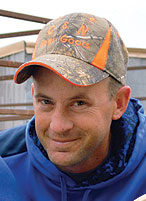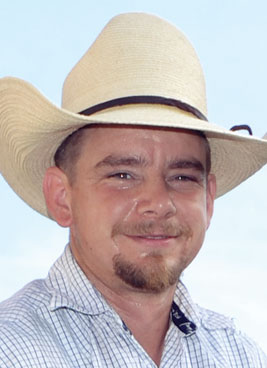
Richard and Melissa Nevills happily admit they are “horse people.” The two fell head over “hooves” in love the day Richard, who was working as a farrier, arrived at Melissa’s family farm to shoe her horses.
Wedding bells soon followed, along with years of raising, training and selling Quarter horses. But in 2007, the Nevills faced a heartbreaking reality. The horse market they had rode for so many years bottomed out.
“We knew the horse market was pretty much done. We sold down to two horses and two miniature ponies and bought about 10 goats,” Melissa explained.
From that moment on, the Nevills became “goat people.” They purchased 10 head of commercial Boer goats to raise on their 20-acre farm in Strafford, Mo. The Nevills had been partnering with Melissa’s parents, Tony and Regina Combs, with the horses so the two families decided to keep the partnership going with the goat operation.
The farm operates under the name C & N Boer Goats. In recent years, Richard and Melissa bought out her parents and now the Nevills run the goat herd themselves.
Richard and Melissa have spent the past decade learning how to manage a quality goat herd. But the road has been a rough one.
“It hasn’t been easy. And there have been several times we have been like, ‘OK we are tired. We are done.’ But we stuck with it and I am glad we did,” Melissa reflected.
Instead of giving up, they pushed harder. Richard and Melissa invested time, money and even more time into developing the type of herd they wanted.
“If you start out small and grow big, you will get there. It takes time,” Richard said.
In 2010, the couple bought a registered Boer doe from Bill Stanton, owner of Quality Boers, in Marshfield, Mo. The purchase launched the Nevills’ journey into registered Boer goats. The Nevills currently manage 15 to 20 registered Boer does and take the best of their herd to local and regional shows. The Nevills won overall grand champion this past summer in Harrison, Ark.
The Nevills have found artificially inseminating their does is the best way for them to produce quality show goats. They spend hours researching the top bucks in the breed before choosing which ones to use.
The couple uses an estrus synchronization protocol developed by veterinarian, Darren Loula to narrow the window of when all their does will conceive. The Nevills utilize Controlled Internal Drug Releases (CIDRs) and give their goats the medication required for estrus synchronization.
Richard and Melissa discovered there are many benefits to their does coming into heat and kidding around the same time. C & N Boer Goats has two kidding seasons, one in September and October, and another in January.
Three years ago, the Nevills started inducing their pregnant does. They wait until the doe is within three to five days of her due date.
“We keep very good records. We know exactly who is bred to whom and when they are going to kid. And I induce them,” explained Melissa. “Knock on, wood I have not lost a baby since I have done that.”
In years past, the Nevills lost kids because they weren’t home when their does went into labor or a young doe went too far past her due date.
“This is the third year we have been doing it (inducing labor) and I really like the results. Some people might not agree with it, but I am telling you it works,” Melissa said.
Another strategy that works for C & N Boer Goats is rotating the goats once a month to a new pasture.
“The worms only go up on the grass two or three inches, so if they (the goats) are eating higher up and not picking off the ground they stay healthier,” Richard said.
In addition to the typical vaccination schedule for their animals, the Nevills started giving their goats the BRSV (Bovine Respiratory Syncytial Virus) vaccine, which is typically used in cattle. The Nevills use the vaccine to combat the summer coughs their goats sometimes acquire.
But nothing goes further toward herd health than a keen eye on their animals.
“Any little difference in them you better doctor them right away or you won’t have them the next day. They go downhill so fast,” Richard said.
The Nevills’ passion for their goats intensified nine months ago when they had a kid of their own. Now their work on the farm is fueled by the love they have for their son Luke. “Most of what we are doing now is for him. For him to show and for him to be competitive,” Melissa concluded with a smile.







